Wikipedia:Picture of the day/July 2011
|
Featured picture tools: |
These featured pictures, as scheduled below, appeared as the picture of the day (POTD) on the English Wikipedia's Main Page in July 2011. Individual sections for each day on this page can be linked to with the day number as the anchor name (e.g. [[Wikipedia:Picture of the day/July 2011#1]] for July 1).
You can add an automatically updating POTD template to your user page using {{Pic of the day}} (version with blurb) or {{POTD}} (version without blurb). For instructions on how to make custom POTD layouts, see Wikipedia:Picture of the day.Purge server cache
July 1

|
Highway 401, the busiest highway in North America, with only a single vehicle travelling on it due to its partial closure following the Toronto propane explosions in 2008. Highway 401 uses a collector–express system, which separates local and long distance traffic. Photo: Kenny Louie
Recently featured: |
July 2

|
|
A map of the native range of the four subspecies of painted turtle (Chrysemys picta), a pond turtle found in slow-moving fresh waters in North America. Eastern (C. p. picta) Midland (C. p. marginata) Southern (C. p. dorsalis) Western (C. p. bellii) Mix of eastern and midland Mix of eastern and southern Mix of midland and western Map: Fallschirmjäger
Recently featured: |
July 3

|
A portrait of Giovanna Tornabuoni, the daughter in law of Giovanni Tornabuoni. She was a member of the Albizzi family, who were rivals of the Medici and Alberti families, and were at the centre of Florentine oligarchy starting from 1382 in the reaction that followed the Ciompi revolt. However, after Cosimo de' Medici returned from exile in 1434 (arranged by Rinaldo degli Albizzi) and regained power, he in turn exiled all but one of the Albizzis from Florence. This painting was done around 1490, long after the Albizzis' fall from grace. Artist: Domenico Ghirlandaio
Recently featured: |
July 4

|
"Join, or Die", a 1754 editorial cartoon by Benjamin Franklin, a woodcut showing a snake severed into eight pieces, with each segment labeled with the initials of a British American colony or region (not all colonies are represented). It was originally about the importance of colonial unity against France during the French and Indian War, and re-used in the years ahead of the American Revolution to signify unity against Great Britain. Restoration: Adam Cuerden
Recently featured: |
July 5

|
Macleay's Swallowtail (Graphium macleayanus) is a swallowtail butterfly native to Australia, named after Scottish entomologist Alexander Macleay. It is found in coastal areas of Eastern Australia and on Tasmania. It has a wingspan of about 55 mm (2.2 in), with females being larger than males. Photo: JJ Harrison
Recently featured: |
July 6

|
The Painted Cliffs of Maria Island, a small mountainous island off the east coast of Tasmania. The cliffs are made of sandstone with patterns formed through staining by iron oxide. The entire island is taken up by Maria Island National Park and has no permanent residents, apart from some park rangers. Photo: JJ Harrison
Recently featured: |
July 7

|
On July 7, 1865, at Fort McNair in Washington, D.C., Mary Surratt, Lewis Powell, David Herold, and George Atzerodt (shown left-to-right) were hanged for their roles in the assassination of U.S. President Abraham Lincoln. Eight people were convicted for the crime; three others were sentenced to life imprisonment, with the last receiving a six-year sentence. Mary Surratt's son John was able to escape and was never convicted for his role. His mother was the first woman to be executed by the United States federal government. Photo: Alexander Gardner; Restoration: Lise Broer
Recently featured: |
July 8
|
A panoramic view of some of the vineyards that make up the Napa Valley American Viticultural Area (AVA) in Northern California. Napa Valley is considered one of the top winemaking regions in the United States, and as shown in the Paris Wine Tasting of 1976, is capable of producing the best quality wine—equal to that of Old World wine regions. Photo: Mila Zinkova |
July 9

|
Megaliths, some decorated, were a part of the culture of the island of Nias off the western coast of Sumatra, Indonesia. Among the many uses of these large stones were statues, seats for the chieftains, and tables where justice was done. Additionally, some stones commemorated the deaths of important people. In this 1915 photo, such a stone is hauled upwards, reportedly taking 525 people three days to erect in the village of Bawemataloeo. Photo: Ludwig Borutta; Restoration: Lise Broer |
July 10

|
|
A panoramic view of Eastbourne, a large seaside town in East Sussex, England, as seen from the west on Beachy Head. Eastbourne's earliest claim as a seaside resort was a summer holiday visit by four of King George III's children in 1780. Although Eastbourne has industrial trading estates, it derives its main income from tourism, the focus of which is the four miles (6 km) of shingle beach, lined with hotels and guest houses. Photo: David Iliff |
July 11

|
The Common Nighthawk (Chordeiles minor) is a species of nightjar that is native to the Americas. It breeds in open country across North America and migrates in flocks to wintering grounds in South America. As seen here, the Common Nighthawk does not build a nest, but instead lays eggs on bare ground. Photo: Gavin Schaefer
Recently featured: |
July 12

|
"After the war, a medal and maybe a job", an anti-World War I editorial cartoon showing a soldier who is missing the lower half of his body dragging himself along with his hands, with his intestines trailing behind him. A fat capitalist sitting in a chair offers him a medal for his service. Artist: John French Sloan; Restoration: Lise Broer
Recently featured: |
July 13

|
The cover to the June 1914 issue of Vanity Fair, an American magazine published from 1913 to 1936 by Condé Montrose Nast, the first of many published by his company Condé Nast Publications. Nast purchased a men's fashion magazine titled Dress in 1913 and renamed it Dress and Vanity Fair. In 1914, the title was shortened to Vanity Fair. During its run, it competed with The New Yorker as the American establishment's top culture chronicle and featured writing by Thomas Wolfe, T. S. Eliot, P. G. Wodehouse, and Dorothy Parker. However, it became a casualty of the Great Depression and declining advertising revenues, and it was folded into Vogue in 1936. In 1983, Condé Nast revived the title as a new publication. Artist: Ethel McClellan Plummer; Restoration: Lise Broer
Recently featured: |
July 14

|
A self-portrait of Louis-Marie Autissier (1772–1830), a French-born Belgian portrait miniature painter. He is considered the founder of the Belgian school of miniature painting in the nineteenth century. Born at Vannes, in Brittany, he joined the French Revolutionary Army at Rennes in 1791. On leaving the army in 1795, Autissier went to Paris and trained his art by studying paintings at the Louvre. In 1796 he settled in Brussels, but continued to divide his time between Belgium, the Netherlands, and France. Although he enjoyed great success in his career, serving as court painter to Louis Napoleon, French King of the Netherlands, and later to Willem I, Autissier died penniless.
Recently featured: |
July 15
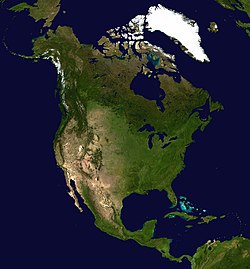
|
A composite satellite image of the continent of North America in orthographic projection. North America occupies the northern portion of the landmass generally known as the Americas, with its southern border at the Darién watershed along the Colombia–Panama border. The vast majority of North America rests on the North American Plate, while small parts of California and western Mexico rest on the Pacific Plate; Central America and the Caribbean islands rest on the Caribbean Plate. Photo: NASA
Recently featured: |
July 16
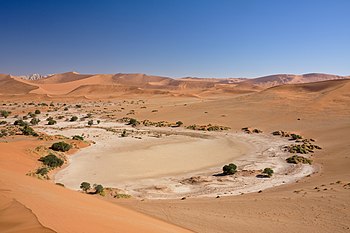
|
Sossusvlei is a salt and clay pan surrounded by high red dunes, located in the southern part of the Namib Desert, in the Namib-Naukluft National Park of Namibia. Its name derives from its status as an endorheic drainage basin (i.e., without outflows) for the ephemeral Tsauchab river: "Vlei" is the Afrikaans word for "marsh", while "sossus" is Nama for "no return" or "dead end". Photo: Ikiwaner
Recently featured: |
July 17
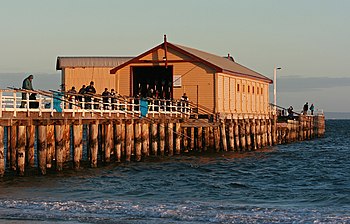
|
People jigging—fishing with a type of lure known as a "jig"—for squid in Queenscliff, Victoria, Australia. A jig consists of a lead sinker with a hook molded into it and usually covered by a soft body to attract fish. Jigs are intended to create a jerky, vertical motion, as opposed to spinnerbaits which move through the water horizontally. Photo: John O'Neill
Recently featured: |
July 18

|
The Quiver tree (Aloe dichotoma) is a species of aloe indigenous to Southern Africa, specifically in the Northern Cape region, and Namibia. It derives its common name from the indigenous San practice of hollowing out its tubular branches to form quivers for arrows. One of the few examples of spontaneous forests of A. dichotoma is the Quiver Tree Forest, located north of Keetmanshoop, Namibia. Photo: Le Grand Portage
Recently featured: |
July 19

|
USS Annapolis, resting in the Arctic Ocean after surfacing through three feet of ice during Ice Exercise 2009 in March 2009. The two-week training exercise was used to test submarine operability and war-fighting capability in Arctic conditions, and also involved the USS Helena, the University of Washington and personnel from the Navy Arctic Submarine Laboratory. Photo: Petty Officer 1st Class Tiffini M. Jones, U.S. Navy
Recently featured: |
July 20
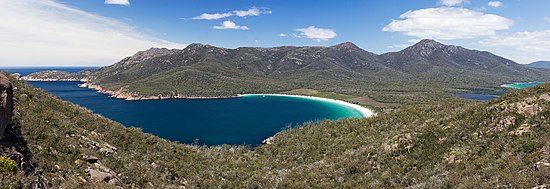
|
|
Wineglass Bay, in the Freycinet Peninsula of eastern Tasmania, with Mount Freycinet (right) and Mount Graham (left) visible behind. Nicolas Baudin named the peninsula after French explorer Louis de Freycinet, one of the first to produce a comprehensive map of the coastline of Australia. Photo: JJ Harrison
Recently featured: |
July 21
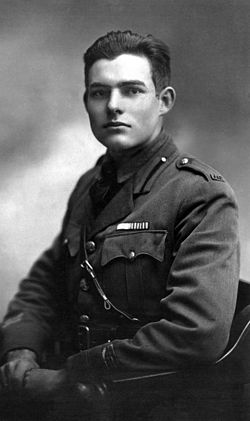
|
American author Ernest Hemingway (1899–1961) in 1918, dressed in the uniform of an ambulance driver for the International Red Cross during World War I, where he was stationed on the Italian front. On July 8 he was seriously wounded by mortar fire. Despite his wounds, Hemingway carried an Italian soldier to safety, for which he received the Italian Silver Medal of Bravery. He sustained shrapnel wounds to both legs, underwent an operation at a distribution center, spent five days at a field hospital, and was transferred to the Red Cross hospital in Milan for a six-month period of recuperation. Photo: Ermeni Studios; Restoration: Beao
Recently featured: |
July 22

|
The massive, young super star cluster, called R136, is only a few million years old and resides in the Tarantula Nebula, a turbulent star-birth region in the Large Magellanic Cloud, a satellite galaxy of our Milky Way. There is no known star-forming region in our galaxy as large or as prolific as the Tarantula Nebula. The image, taken in ultraviolet, visible, and infrared light by the Hubble Space Telescope's Wide Field Camera 3, spans about 100 light-years. Photo: NASA, ESA, and F. Paresce, R. O'Connell, and the Wide Field Camera 3 Science Oversight Committee |
July 23
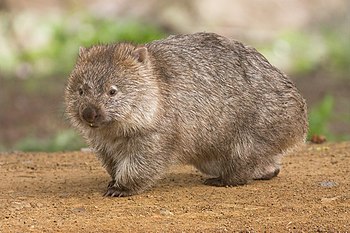
|
The common wombat (Vombatus ursinus) is one of three species of wombat. It is native to south-eastern mainland Australia and Tasmania, and grows to an average of 98 cm (39 in) long and a weight of 26 kg (57 lb). It is solitary and lives in an underground burrow. Photo: JJ Harrison
Recently featured: |
July 24

|
The Mitchell Map is the most comprehensive map of eastern North America made during the colonial era. Measuring about 6.5 ft (2.0 m) wide by 4.5 ft (1.4 m) high, it was produced by John Mitchell in 1757 in eight separate sheets. The map was used during the Treaty of Paris for defining the boundaries of the United States, and remains important today for resolving border disputes. Author: John Mitchell; scan: Library of Congress, Geography and Map Division.
Recently featured: |
July 25

|
|
Crib Goch is an arête in Snowdonia national park, Wales, reaching 923 m (3,028 ft) above mean sea level. It is a popular destination for mountaineering, but even experienced climbers have suffered fatalities on it. It is also the wettest spot in the United Kingdom, with an average of 4,473 millimetres (176.1 in) rainfall a year over the past 30 years. Photo: David Iliff
Recently featured: |
July 26

|
Sarcophaga nodosa, a species of flesh-fly in the Sarcophaga genus, feeding on decaying meat. Members of the genus can be found worldwide and many of them are difficult to tell apart with the naked eye. Photo: Muhammad Mahdi Karim
Recently featured: |
July 27

|
Ocean waves and gravity have caused enough erosion on the cliffs here in Pacifica, California, that the building is in danger of falling over the edge. Erosion is the process by which sediment, soil, rock and other particles, are removed from a region of the Earth's surface. Erosion is distinguished from weathering, although the two processes may occur concurrently. Photo: Mila Zinkova
Recently featured: |
July 28

|
The Ursus C-451 was a popular model of tractor, manufactured by the Ursus Factory, based on the German Lanz Bulldog D9506. Production of the original model, the C-45, began in 1946, and was replaced by the improved C-451 in 1954. Ursus discontinued the model in 1959, and the design was then sold to Zakłady Mechaniczne in Gorzów Wielkopolski. Photo: Łukasz Golowanow & Maciek Hypś
Recently featured: |
July 29

|
|
The village of Kingswear, located in the South Hams area of the English county of Devon, as seen from across the River Dart in Dartmouth. It is mostly noted as being the railhead for Dartmouth, a role it continues to this day as the terminus for the Paignton and Dartmouth Steam Railway, a seasonally operated heritage railway. Photo: Herbythyme
Recently featured: |
July 30

|
A sand storm sweeps across the Red Sea in this 2005 satellite image. Also called "dust storms", they commonly occur in arid or semi-arid climates when strong wind blows loose sand and dust from a dry surface. Particles are transported by saltation and suspension, causing soil erosion from one place and deposition in another. Photo: Jacques Descloitres, MODIS Rapid Response Team, Goddard Space Flight Center
Recently featured: |
July 31

|
The flower of an Isophysis tasmanica plant, the only member of the Isophysis genus in the iris family. The plant is endemic to the mountains of Western Tasmania, growing in heathland on sandy soils. It has grass-like foliage and star-like dark red-purple or yellow flowers with reflexed tepals, as well as a characteristic superior ovary which distinguishes it from other Iridaceae. Photo: JJ Harrison
Recently featured: |
Picture of the day archives and future dates

